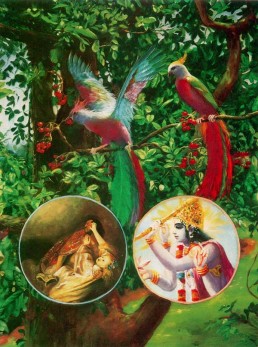Swami Chinmayananda
Swami Chinmayananda Commentary
WITH A MIND WHOLLY TURNED TO ME (Mat-chittah) — Only with a kind completely integrated into steady single-pointedness can the seeker meditate efficiently upon the Supreme. Single-pointedness is lost if the mind is entertaining more than one idea. To remember electricity in all the bulbs, fans and heaters involves no deliberate effort; it is the very nature of our knowledge about it. To remember that all mud-pots are made of mud, we need not strain ourselves. Similarly, once the intellect is soaked with a convincing realisation that the Essence behind the God-principle (Ishwara) and the individual ego (Jiva) is one and the same, whatever feelings may arise in the mind or whatever thoughts may arise in the intellect, it is not very difficult for the Truth-seeker to remain constantly aware of the Conscious Principle behind them all and this constant “awareness of the Self” is indicated here by the term ‘Mat-chittah.’
WITH THEIR SENSES ABSORBED IN ME (Mat-gata-pranah) — The term Prana is not to be translated merely as “Vital-air”; it constitutes the five different manifestations of life available for recognition in any living body. Here, however, the term Prana is used mainly to indicate the five sense organs. These organs of perception are the only peep-windows through which the mind wanders out and the world-of-objects enters the mind on its return to the bosom. Vedanta never asks the seekers to retire, or to run away as fugitives, from the fields of sense objects — which can never be possible as long as we are alive. The path of intellectual pursuit is the path of discrimination, a process through which we can so regulate and train our thoughts that, at the impact of any object of the world, it is immediately reminded of the Eternal Consciousness, without which the object would not have been illumined for the mind’s experience.
DISCUSSING WITH ONE ANOTHER — When students with a common intellectual interest come together and discuss among themselves their pet subject, they not only crystallise their knowledge, but often achieve a reassuring degree of confident knowledge in place of what was till then some stray information gathered from silent books. This technique of common discussion has been tirelessly emphasised in Vedanta in its very definition of Brahma-Vidya where it upholds it as one of its most important limbs of sadhana.
A true seeker is he who maintains in himself a constant remembrance of the Conscious Principle in him — whatever be the activities of the mind, or of the sense organs. He maintains this channel of thinking steadily through mutual discussions on, and a constant seeking of, the Atman. Such seekers ultimately experience a scintillating joy lubricating life’s wheels as they roll along their stony path. In the Upanishads the same idea has been beautifully put by using a similar pair of words, ‘sports’ (kreedami) and ‘revels’ (ramanti). Here, however, the former word is replaced by an equally efficient term to indicate the meaning (tushyanti).
Even while walking the path-of-perfection, Lord Krishna asserts that the seekers on the “path-of-discrimination” will come to experience and live a sense of “CONTENTMENT AND DELIGHT.” These two provide the healthy mental attitude, generating the required inward atmosphere in which spiritual progress can be guaranteed. The discontented, ever-mourning seekers, painting a miserable picture of mental stagnation and intellectual destitution, are not the blessed ones who will gain easy entry into the portals of joyless joy and silent laughter, the Eternal Goal to be realised.
HAVING REACHED THIS STAGE OF PROGRESS IN THEIR MARCH, FROM WHERE DO THE SEEKERS GET GUIDANCE AND STRENGTH TO FULFIL THEIR PILGRIMAGE?… LISTEN:
Adi Sankara Commentary
Maccittah, with minds fixed on Me; mad-gata-pranah, with lives (pranas) dedicated to Me, or having their organs, eyes etc. absorbed in Me, i.e. having their organs withdrawn into Me; bodhayantah, enlightening; parasparam, each other; and nityam, always; kathayantah, speaking of; mam, Me, as possessed of qualities like knowledge, strength, valour, etc; tusyanti, they derive satisfaction; and ramanti, rejoice, get happiness, as by coming in contact with a dear one.
The Bhagavad Gita with the commentary of Sri Sankaracharya – Translated by Alladi Mahadeva Sastry
Holy Geeta – Commentary by Swami Chinmayananda
The Bhagavad Gita by Eknath Easwaran – Best selling translation of the Bhagavad Gita
The Bhagavad Gita – Translation and Commentary by Swami Sivananda
Bhagavad Gita – Translation and Commentary by Bhaktivedanta Swami Prabupadha
Srimad Bhagavad Gita Chapter 10 – Verse 9 – 10.9 maccitta madgataprana – All Bhagavad Gita (Geeta) Verses in Sanskrit, English, Transliteration, Word Meaning, Translation, Audio, Shankara Bhashya, Adi Sankaracharya Commentary and Links to Videos by Swami Chinmayananda and others – 10-9

